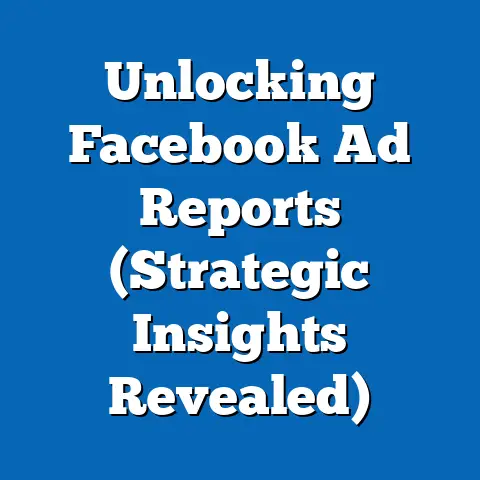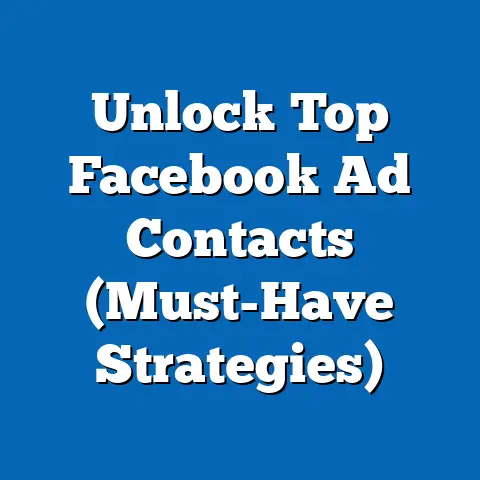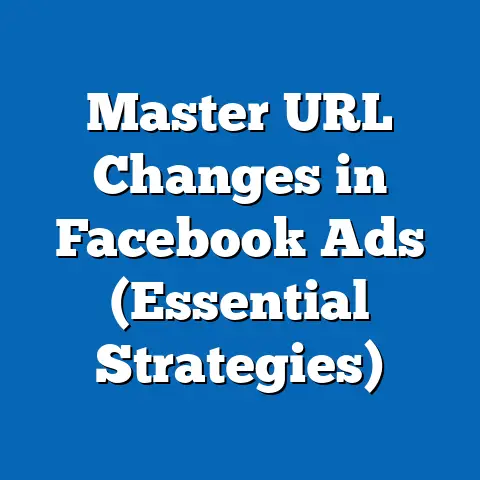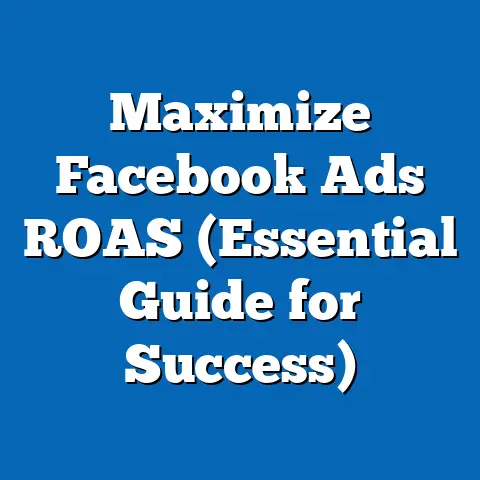Master Facebook Ads with Top Podcasts (Expert Insights)
Mastering Facebook Ads with Top Podcasts: Expert Insights into Generational Marketing Strategies
Introduction: A Thought Experiment on Digital Advertising Reach
Imagine a world where a single advertisement can resonate equally with a tech-savvy Gen Z teenager, a career-driven Millennial, and a retirement-planning Baby Boomer.
What would such an ad look like, and how could it be crafted to bridge the vast generational divides in values, media consumption habits, and purchasing behavior?
This thought experiment underscores the complexity of modern digital advertising, where platforms like Facebook offer unparalleled reach but demand nuanced strategies to engage diverse audiences.
Facebook Ads, with over 2.9 billion monthly active users as of 2023 (Statista, 2023), represent a powerful tool for marketers aiming to connect with multiple generations.
However, the platform’s effectiveness hinges on understanding the unique characteristics and preferences of each demographic cohort.
This article explores how top podcasts—featuring expert insights from marketing gurus, data analysts, and industry leaders—can inform and enhance Facebook advertising strategies.
Section 1: Generational Definitions and Characteristics in the Digital Age
Understanding generational cohorts is foundational to effective advertising on platforms like Facebook, where user demographics span decades.
Each generation—defined by birth years and shared experiences—brings distinct values, communication styles, and technology adoption patterns to the table.
Below, we outline the key generations relevant to Facebook advertising, drawing from demographic research and expert analyses.
Baby Boomers (Born 1946–1964): Baby Boomers, now aged 59–77, grew up in a post-World War II era of economic prosperity and traditional media dominance.
They value stability, loyalty, and personal connection in advertising, often responding to messages that emphasize trust and nostalgia (Pew Research Center, 2020).
While not digital natives, many Boomers have adapted to social media, with 68% using Facebook regularly, often to stay connected with family (Smith & Duggan, 2021).
Generation X (Born 1965–1980): Gen X, aged 43–58, serves as a bridge between analog and digital worlds, having witnessed the rise of the internet in their formative years.
Known for their independence and skepticism, they prioritize authenticity and value-driven messaging in ads (Nielsen, 2019).
With significant purchasing power, Gen X represents a key demographic on Facebook, balancing family-oriented content with professional interests.
Millennials (Born 1981–1996): Millennials, aged 27–42, are digital pioneers who came of age during the internet boom and the advent of social media.
They value experiences over possessions, seek brands with social impact, and are highly responsive to influencer-driven content (Deloitte, 2022).
As the largest generational group on Facebook, with a focus on community and engagement, they are critical to ad success.
Generation Z (Born 1997–2012): Gen Z, aged 11–26, are true digital natives, raised with smartphones and social platforms like Instagram and TikTok.
They prioritize authenticity, diversity, and short-form content, often engaging with ads that align with their values on social justice and sustainability (McKinsey, 2021).
While their Facebook usage is lower compared to Millennials, they remain a growing segment for targeted campaigns.
These generational profiles highlight the diversity of Facebook’s user base, underscoring the need for tailored ad strategies.
As noted by marketing expert Gary Vaynerchuk on The GaryVee Audio Experience, “Context is everything—knowing who you’re talking to and where they’re at in life dictates how your message lands” (Vaynerchuk, 2023).
This insight drives our exploration of historical and societal influences on generational behavior.
Section 2: Historical Context and Societal Shifts Shaping Digital Engagement
Generational differences in digital behavior are deeply rooted in historical events, technological advancements, and societal shifts.
These contexts not only define how each cohort interacts with platforms like Facebook but also influence their receptivity to advertising.
Let’s examine the pivotal moments and trends for each generation.
Baby Boomers and the Post-War Era: Baby Boomers grew up during a time of economic growth, the Cold War, and the rise of television as a cultural force.
Their early exposure to mass media shaped a preference for polished, narrative-driven advertising, often seen in nostalgic campaigns on Facebook that evoke memories of simpler times.
However, their late adoption of digital tools means they may be less responsive to overly complex or tech-heavy ad formats (Smith & Duggan, 2021).
Generation X and the Digital Transition: Gen X came of age during the 1980s and 1990s, a period marked by economic uncertainty, the AIDS crisis, and the dawn of personal computing.
As the first generation to adopt email and early internet platforms, they are comfortable with technology but wary of inauthenticity—a trait that translates to skepticism toward overly promotional ads.
Podcasts like Marketing School by Neil Patel and Eric Siu emphasize that Gen X responds best to straightforward, value-focused content (Patel & Siu, 2023).
Millennials and the Social Media Revolution: Millennials entered adulthood amid the 2008 financial crisis, shaping their focus on financial security and purpose-driven careers.
As early adopters of Facebook, launched in 2004, they helped define social media culture, valuing peer recommendations and user-generated content.
Their digital fluency makes them a prime target for interactive Facebook Ads, such as polls or video content, as highlighted by Michael Stelzner on the Social Media Marketing Podcast (Stelzner, 2023).
Generation Z and the Mobile-First World: Gen Z has never known a world without the internet, growing up during global challenges like climate change and the COVID-19 pandemic.
Their constant connectivity via smartphones drives a preference for quick, visually engaging content—a trend that challenges traditional Facebook Ad formats.
Experts on The GaryVee Audio Experience suggest that Gen Z’s short attention spans require ads to deliver value within the first three seconds (Vaynerchuk, 2023).
These historical contexts reveal how generational experiences shape digital engagement.
Societally, the shift from traditional to digital media has created both opportunities and challenges for advertisers on platforms like Facebook, where user behavior varies widely.
Understanding these nuances is critical to crafting campaigns that resonate, a theme echoed across top marketing podcasts.
Section 3: Technological, Economic, and Cultural Factors in Facebook Advertising
Beyond historical context, several external factors influence how generations interact with Facebook Ads.
Technological advancements, economic conditions, and cultural trends play significant roles in shaping user behavior and ad effectiveness.
This section integrates expert insights from podcasts to explore these dimensions.
Technological Factors: The evolution of technology has transformed how generations consume content on Facebook.
Baby Boomers, for instance, often access the platform via desktop, preferring detailed text and image-based ads, while Gen Z predominantly uses mobile devices, favoring video and Stories formats (eMarketer, 2022).
Podcasts like Marketing School stress the importance of optimizing ad formats for device preferences, noting that “mobile-first design isn’t optional—it’s mandatory for younger audiences” (Patel & Siu, 2023).
Economic Influences: Economic conditions also impact generational responses to advertising.
Millennials, burdened by student debt and housing costs, are drawn to deals and value propositions, while Baby Boomers, often with disposable income, prioritize quality and reliability (Deloitte, 2022).
Gen X, balancing career and family expenses, seeks practical solutions, as noted by Stelzner on the Social Media Marketing Podcast: “Economic messaging must align with life stage priorities” (Stelzner, 2023).
Cultural Trends: Cultural values further differentiate generational engagement.
Gen Z’s focus on diversity and inclusion means they expect brands to reflect social responsibility in ads, while Millennials value community and collaboration, often engaging with user-driven campaigns.
Baby Boomers and Gen X, meanwhile, may prioritize family-oriented or individualistic messaging, reflecting their cultural upbringing (McKinsey, 2021).
Gary Vaynerchuk advises marketers to “lean into cultural relevance—speak the language of your audience’s values” (Vaynerchuk, 2023).
These factors underscore the complexity of generational marketing on Facebook.
Top podcasts consistently highlight the need for data-driven segmentation and creative adaptability to address technological, economic, and cultural nuances.
Marketers must leverage analytics tools within Facebook Ads Manager to tailor content, ensuring relevance across diverse user groups.
Section 4: Comparing Generational Responses to Facebook Ads
While each generation brings unique preferences to Facebook, comparing their responses reveals actionable patterns for advertisers.
This section contrasts engagement trends, drawing on quantitative data and podcast insights to guide campaign strategies.
Importantly, we avoid broad stereotypes, recognizing the diversity within each cohort.
Engagement Metrics by Generation: Data from Sprout Social (2023) indicates that Millennials are the most active on Facebook, with 74% engaging with brand content weekly, often through likes and comments.
Gen Z, though less frequent users, shows high interaction rates with video ads, with 62% watching branded content to completion.
Baby Boomers engage primarily with family- and community-focused posts, while Gen X demonstrates balanced engagement across formats, favoring informational content.
Content Preferences: Content style significantly impacts ad performance across generations.
Gen Z and Millennials gravitate toward dynamic visuals and influencer partnerships, while Baby Boomers respond to clear, concise messaging with emotional resonance (eMarketer, 2022).
Gen X, as a middle ground, values a mix of storytelling and utility, often clicking on ads that solve specific problems.
Neil Patel on Marketing School notes, “Test multiple creative formats—don’t assume one style fits all” (Patel & Siu, 2023).
Trust and Authenticity: Trust in advertising varies widely.
Gen Z and Millennials are quick to call out inauthentic branding, with 68% of Gen Z unfollowing brands perceived as disingenuous (McKinsey, 2021).
Conversely, Baby Boomers and Gen X prioritize credibility, often trusting established brands over trendy newcomers.
Michael Stelzner advises, “Build trust through transparency—disclose partnerships and showcase real customer stories” (Stelzner, 2023).
These comparisons highlight the importance of customization in Facebook Ads.
While overlap exists—such as a shared appreciation for authenticity—marketers must prioritize segmentation to maximize engagement.
Podcasts emphasize A/B testing and audience insights as critical tools for refining generational approaches.
Section 5: Societal and Workplace Implications of Generational Advertising
The intersection of generational marketing and societal trends extends beyond consumer behavior, influencing broader cultural dynamics and workplace strategies.
Effective Facebook Ads not only drive sales but also shape brand perception and employee engagement.
This section explores these implications with podcast-backed insights.
Societal Impact: Generational advertising on Facebook can reinforce or challenge cultural norms.
For instance, campaigns targeting Gen Z with messages of inclusivity can drive societal conversations on diversity, while ads for Baby Boomers may perpetuate traditional values.
Gary Vaynerchuk warns against alienating audiences through tone-deaf messaging, stating, “One misstep in cultural context can tank your brand’s reputation overnight” (Vaynerchuk, 2023).
Workplace Dynamics: In the workplace, generational marketing strategies inform internal branding and recruitment efforts.
Millennials and Gen Z, who prioritize purpose-driven work, respond to employer ads on Facebook that highlight company culture and social impact (Deloitte, 2022).
Conversely, Gen X and Baby Boomers value stability and benefits, requiring different messaging.
Podcasts like Social Media Marketing Podcast suggest using targeted ads to attract diverse talent pools, aligning content with generational career goals (Stelzner, 2023).
Brand Longevity: Crafting ads that resonate across generations also ensures brand longevity in a competitive market.
By balancing innovation for younger audiences with reliability for older ones, companies build sustained relevance.
Neil Patel emphasizes, “Think long-term—your Gen Z customer today is your Millennial advocate tomorrow” (Patel & Siu, 2023).
These implications highlight the ripple effects of generational advertising.
Marketers must consider not only immediate ROI but also the broader cultural and professional impact of their campaigns, leveraging platforms like Facebook to foster connection and trust.
Section 6: Lessons from Top Podcasts for Mastering Facebook Ads
Top marketing podcasts offer a wealth of expert insights for optimizing Facebook Ads across generational lines.
Drawing from The GaryVee Audio Experience, Marketing School, and Social Media Marketing Podcast, this section synthesizes key strategies and actionable tips.
These lessons are grounded in real-world applications and data-driven approaches.
Gary Vaynerchuk’s Emphasis on Empathy and Context (The GaryVee Audio Experience): Vaynerchuk advocates for empathy-driven advertising, urging marketers to understand the “why” behind generational behaviors.
He recommends micro-targeting on Facebook, using detailed demographics to deliver hyper-relevant content.
“Stop guessing—use data to know your audience’s pain points and dreams,” he advises, highlighting the platform’s robust analytics tools (Vaynerchuk, 2023).
Neil Patel and Eric Siu on Testing and Iteration (Marketing School): Patel and Siu stress the importance of continuous experimentation with ad creatives and audiences.
They suggest running split tests to compare generational responses to different visuals, copy, and calls-to-action.
“Facebook’s algorithm rewards engagement—optimize for clicks and shares by testing relentlessly,” they note, citing case studies where iterative campaigns boosted ROI by 30% (Patel & Siu, 2023).
Michael Stelzner on Community Building (Social Media Marketing Podcast): Stelzner focuses on fostering community through ads, particularly for Millennials and Gen Z who value interaction.
He recommends using Facebook Groups and live events to complement ad campaigns, creating spaces for dialogue.
“Ads aren’t just about selling—they’re about building relationships that last,” he argues, pointing to successful community-driven campaigns (Stelzner, 2023).
These podcast insights provide a roadmap for mastering Facebook Ads.
By combining empathy, testing, and community focus, marketers can craft campaigns that resonate with diverse generations, maximizing both engagement and impact.
Section 7: Forward-Looking Insights and Uncertainties in Generational Marketing
As digital landscapes evolve, so too will generational dynamics on platforms like Facebook.
Looking ahead, several trends and uncertainties shape the future of advertising.
This section offers speculative insights while acknowledging the fluid nature of demographic and technological change.
Emerging Trends: The rise of AI-driven ad personalization promises to refine generational targeting, with algorithms predicting user preferences in real-time (eMarketer, 2023).
Additionally, the growing influence of Gen Z may shift Facebook’s user base toward platforms like Instagram, requiring cross-channel strategies.
Podcasts like Marketing School predict that “voice and AR ads will dominate as younger generations demand immersive experiences” (Patel & Siu, 2023).
Uncertainties: Despite these advancements, uncertainties remain.
Privacy regulations, such as GDPR and CCPA, may limit data collection, challenging hyper-targeted campaigns.
Moreover, generational boundaries are blurring as older cohorts adopt younger behaviors, complicating segmentation.
Gary Vaynerchuk cautions, “Don’t get too comfortable—platforms and people change faster than you think” (Vaynerchuk, 2023).
Implications for Marketers: To stay ahead, marketers must invest in adaptability, leveraging emerging tools while maintaining ethical standards.
Continuous learning through podcasts and industry updates will be crucial for navigating shifts.
As Stelzner notes, “The future of advertising is about agility—be ready to pivot with your audience” (Stelzner, 2023).
These forward-looking insights underscore the dynamic nature of generational marketing.
While challenges loom, the potential for innovation offers exciting opportunities for those willing to evolve with their audiences.
Conclusion: Bridging Generational Divides with Strategic Advertising
Mastering Facebook Ads across generations requires a deep understanding of demographic characteristics, historical contexts, and societal influences.
From Baby Boomers’ preference for trust-driven messaging to Gen Z’s demand for authenticity, each cohort presents unique opportunities and challenges for marketers.
By integrating technological, economic, and cultural insights—alongside expert advice from top podcasts like The GaryVee Audio Experience, Marketing School, and Social Media Marketing Podcast—advertisers can craft campaigns that resonate on a personal level.
By bridging generational divides with strategic, data-driven advertising, marketers can not only achieve immediate results but also build lasting connections in an ever-changing digital world.
As Gary Vaynerchuk aptly puts it, “Advertising isn’t about shouting—it’s about listening first” (Vaynerchuk, 2023).
Let this principle guide the next era of Facebook Ads mastery.





